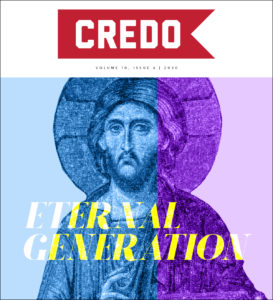It is not uncommon to read contemporary works of theology, wherein the doctrine of eternal generation is dismissed as irrelevant speculation. In the estimation of some, we need feel no allegiance to an esoteric doctrine that is more “Greek-philosophical” than “biblical.” And if the doctrine does hang onto the Christian tradition like an odd appendage that serves no other purpose than to illustrate the strange mutations in church history, discarding it may seem entirely appropriate. However, in this instance we may answer the call to retire eternal generation in the spirit of G.K. Chesterton:
There exists in such a case a certain institution or law; let us say, for the sake of simplicity, a fence or gate erected across a road. The more modern type of reformer goes gaily up to it and says, “I don’t see the use of this; let us clear it away.” To which the more intelligent type of reformer will do well to answer: “If you don’t see the use of it, I certainly won’t let you clear it away. Go away and think. Then, when you can come back and tell me that you do see the use of it, I may allow you to destroy it.” (G.K. Chesterton, “The Drift from Domesticity” in In Defense of Sanity: The Best Essays of G.K. Chesterton)
In this interview, theologian Bradley Green helps us think through the importance of eternal generation, and why it is so essential we maintain it, especially in a day so unfamiliar with the rich Trinitarian heritage of our fathers.
Why is eternal generation so indispensable to Christian theology?
The term or concept “eternal generation” denotes that the Son was generated from the Father from all eternity. The basic idea is that the Son is indeed “from” the Father (i.e., the Son is “born” of the Father), but that the Son has always been. I think it is these two principles that are at the heart of eternal generation: (1) the Son is from the Father (the Son is generated from the Father); (2) the Son is eternally the Son of the Father.
I still remember reading Athanasius on this for the first time. I think one of the most important theological realities to keep in mind is what Athanasius said: if the Son is not eternally the Son, then the Father is not eternally the Father. One does not have the option of simply sequestering one’s doctrine of the Son from the rest of one’s theology. A mistake on the person of the Son causes a rupture across one’s theological system—especially in one’s doctrine of God. Again, if the Son is not eternally the Son, then the Father is not eternally the Father. A mistake on the person of the Son causes a rupture across one’s theological system—especially in one’s doctrine of God. Share on X
How would you answer the charge that eternal generation is an extra-biblical concept and is therefore unnecessary for Christian theology?
It is a classic example of a theological construct which emerged from Christians wrestling with Scripture in the light of various attempts to make sense of who the Son is. That is, as persons offered various understandings of the Son (for example, the Arians, who said the Son had a “like” or “similar” essence—homoiousios—to the Father) Christians turned to the Scriptures. Then, with various challenges (e.g., the Arians) in mind, Christians tried to make sense of Scripture. They formed this or that theological construct (here the notion of “eternal generation”) as something which the Scriptures pointed to, or entailed. And this is very important to grasp, and why systematic theology is so crucial. At the end of the day, Christians must ask a basic question: Does attention to Holy Write rightfully and properly lead one to engage in systematic theological conclusions and constructs? I think it does.
Does eternal generation not only safeguard theology against the subordination of the Son, but also help us honor the Father as unbegotten?
Eternal generation reminds us that while the Son does indeed “come from” the Father, the Son is also eternal. The Son is eternally the Son, and the Son is eternally divine. The Christian—in affirming eternal generation—is not trying to somehow bypass mystery, but is standing right in the center of a mystery. The traditional Christian, in affirming eternal generation, is saying that the Son and Father are not the same person, but yet are equally divine and eternal. There is a uniqueness to the Father (He is unbegotten), and there is a uniqueness to the Son (he is begotten or generated).
How does eternal generation protect us from the extremes of tritheism on the one side and modalism on the other?
That is a good question. Eternal generation reminds us that who the Son actually is is inextricably linked to who the Father is. That is, the Son is the Son of the Father. The Father is the Father of the Son. When that is kept in mind, it guards against the tritheistic temptation because we see that the Son and the Father are—in a sense—inescapably understood according to their eternal relations to the other. In terms of avoiding modalism (the idea that there is just one person wearing different “masks” at different times), eternal generation reminds us that there really are three persons—possessing the same essence or substance, but being truly different persons.
One of the giants of the patristic era is Augustine. Did Augustine have anything to say about eternal generation?
One of the joys of my doctoral studies was reading Augustine, and eventually writing a dissertation which focused—in part—on Augustine. One of the things I first learned from Augustine was how to think about who God reveals Himself to be in time to who God is in eternity. To be specific, how do I relate what I read in the pages of the Bible (especially the New Testament) with who God is in eternity.
Augustine is quite clear that the sendings in time reveal the relations in eternity. Now, a lot hinges on how far one pushes this. I think we are at least forced to say that there is a true theological “fit” between (1) the sendings in time (i.e. the Father sending the Son and the Spirit) and (2) the relations (of Father, Son, and Spirit) in eternity. That is, if there is not a fit between temporal sendings and eternal relations, then we cannot have confidence that who God reveals himself to be in the pages of Holy Writ actually comport with who he is in eternity. Augustine is quite clear that (1) the Father sending the Son in time reveals (2) the Father and Son’s relations in eternity (which is at least summarized as the Father generating the Son).
Colin Gunton has been very critical of Augustine, a criticism that has been assumed to be true even by evangelicals at times. You, however, have pushed back against Gunton, seeking to retrieve a right view of Augustine. What is Gunton’s view and what is your response?
I first read Colin Gunton in the mid 90’s or so. He was a brilliant theologian, and was very kind to me. It might help readers to know how I came to appreciate Gunton. As a younger man, wanting to be a theologian, I was trying to understand “modernism” and “postmodernism.” At least in my experience—at Baylor University—such discussions were inescapable. Gunton suggested that modernity was really a fundamentally theological issue. This attracted me, for that intuitively seemed right to me. Gunton would quote people like John Ruskin, who could say that modernity begins when people ceased to worship Christ. I think Gunton’s impulse—to try and understand modernity or modernism as a fundamentally theological problem—is exactly right. But as Gunton works out his architectonic history of western culture, he sees the main theological problem to originate with Augustine.
To put it baldly: modernity’s origin is to be seen to lie with certain tendencies and trajectories that Augustine introduces into the Western intellectual tradition. There are specifically two problems, as Gunton saw it. First, Augustine, severs (1) creation from (2) redemption, and creation is seen simply as flowing from a kind of “naked” will in God—i.e., creation is not meaningfully or organically linked to redemption. The theological “answer”—for Gunton, is to be seen in how Irenaeus holds creation and redemption organically together (e.g., as seen in his Proof of the Apostolic Preaching, where God both creates and redeems through His two “hands”—the Son and the Spirit).
Second, according to Gunton Augustine—again, ostensibly—privileges the “One” over the “Many” (the oneness of God over the three persons) and so bequeaths to the West a tendency to likewise give undue or insufficient attention to the particular or to particularity.
Thus, in Gunton’s view there is a kind of over-emphasis on “oneness” in Western culture. In modernity, there was a kind of visceral reaction to this, resulting in a kind of hyper-emphasis on particulars, such that end up with what we see today: a radical emphasis on particularity, with nothing linking or giving unity to particulars (which, ironically, results in its own kind of homogeneity—for all the particulars have an odd kind of “sameness” to them). The “answer” to this theological problem—the problem of an inadequate ontology—was to be found in retrieving the ontology embedded in the Trinitarian thought of the Cappadocians—who more faithfully gave full attention to particulars, to be specific, to the three persons.
I joke that I made a mistake along the way. As I began to write my dissertation on Gunton, I made the mistake of reading Augustine. The more I read it began to dawn on me with increasing clarity: I came to believe that Gunton was misreading Augustine.
So, I argued in my dissertation that Gunton had misread Augustine. And ironically, I concluded that if Gunton was wrong on both accounts of above: (1) Augustine actually did not sever creation from redemption, but actually argued in numerous places for their unity, properly understood; (2) Augustine actually gave significant and proper attention to particulars, including the three persons. I ended up arguing that if one is actually trying to find resources to understand and respond to modernity, and to avail oneself of theological resources from and by which to respond to modernity and its cousin, postmodernity, one could—and should—turn to Augustine. In short, Augustine is a help not a hinderance in working through how to respond to modernity and postmodernity.
In your own experience, how familiar are most pastors with the doctrine of the Trinity or a key pillar of trinitarian theology like eternal generation?
That is a good question. And I simply do not know. I think it depends on (1) where one studied theology and (2) if the pastor has continued to read and study after seminary or theological college. Even though I ended up disagreeing with Colin Gunton, I was helped by such study to begin to work through the centrality of the Trinity to the very nature of the Gospel. I have also been helped to see the link between the Trinity and the Gospel itself by reading and studying and teaching Athanasius, and by spending a lot of time with Augustine. We are more than simply knowers, but we are not less than knowers. And it is important to work through an explicitly biblical theology of knowledge—whether the knowledge of God, of ourselves, or of the rest of creation. Share on X
Given the demands of pastoral ministry, why should pastors take time to consider the deep things of God, including the intricacies of the Trinity?
Jesus himself said that eternal life is “knowing God” (Jn 17:3). I am a little concerned by a trend in Evangelical circles to take shots at the intellectual life by speaking of the “intellectual” emphasis amongst conservative Evangelicals, or by decrying a bogeyman like the “brain on a stick.” Yes, we are more than simply knowers, but we are not less than knowers. And it is important to work through an explicitly biblical theology of knowledge—whether the knowledge of God, of ourselves, or of the rest of creation.
But Jesus himself put a high premium on knowledge by speaking of eternal life as knowing God. And of course Paul can speak of our future state or life in the following way: “For now we see in a mirror dimly, but then face to face. Now I know in part; then I shall know fully, even as I have been fully known” (1 Cor. 13:12). At least here our future state is pictured as knowing God “fully”. If such Scriptures are indeed true, we should likewise be attending now to who this God is, and that means attending to God as a Trinity, and spending some time knowing and worshipping this God now.



